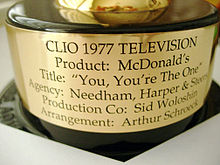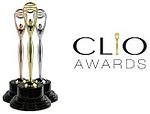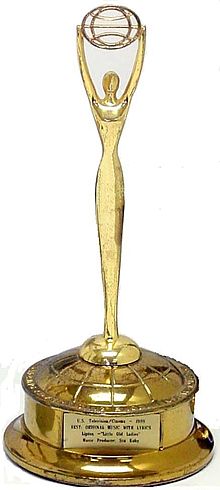- Clio Awards
-
Clio Award
Clio Awards logoAwarded for creative excellence in advertising and design Presented by Prometheus Global Media Country Worldwide First awarded 1960 Official website www.clioawards.com The Clio Awards are annual awards bestowed to reward innovation and creative excellence in advertising, design and communication. The categories include work in nearly all types of media, and the judges are advertising professionals from around the world.[1]
Contents
History
The awards, founded by Wallace A. Ross in 1959, are named for the Greek goddess Clio, the mythological Muse known as "the proclaimer, glorifier and celebrator of history, great deeds and accomplishments."[2] They were first given in 1960 for excellence in television advertising by the American TV and Radio Commercials Festival. Each winner received a gold George Olden designed statuette. The competition was expanded to include work on international television and movies in 1966, then radio ads in the United States for 1967.[2]
The Clio Awards were acquired by Bill Evans in 1972 for $150,000[3] and the Clios became a profitable "for profit" company.[2] Evan's promotion increased the award's prestige for nearly two decades. At one point, the company's income was $2.5 million per year, primarily Clio nomination fees of $70 to $100 per entry.[4]
Evans expanded competition by including U.S. Print advertising in 1971; International Print advertising in 1972; International Radio advertising in 1974; U.S. Packaging design in 1976; International Packaging design and U.S. Specialty advertising in 1977; U.S. Cable advertising in 1983; and Hispanic advertising in 1987.[2]
The rules for the 1984 award required that the entry publicly appear during the calendar year 1983. In order to be eligible, Chiat/Day needed to run Apple Computer's 1984 commercial for the Macintosh computer prior to Super Bowl XVIII. In December 1983, Apple purchased time on KMVT in Twin Falls, Idaho, after the normal sign-off and recorded the broadcast in order to qualify.[5]
1991
The 1991 ceremony is referred as "The Most Bizarre Event in Advertising History,"[6] because it was a complete debacle.
Attendees who had paid the $125 admission price did not have tickets waiting at the door, as promised. Also missing were Clio officials and Clio President, Bill Evans. The event did not start on time; in fact, people stood around drinking, schmoozing and trading rumors about Evans and the Clio organization for over two hours. Finally, the lights dimmed and the band started playing. A man walked up to the microphone and began to speak. He identified himself as the caterer and announced that the master of ceremonies was a no-show, but that he would give it a shot. It started out well, but after being informed that there was no script and no winners list, he gave up and walked off. A second fellow walked onstage and began talking, but was not a polished speaker; it was obvious that he was inebriated. Print ads were the first awards, and there were transparencies of the winning entries. As each image appeared on screen, the owner of the work was asked to come to the stage, pick up their Clio, and identify themselves and their agency. When the last award in the category was dispensed, the band began playing an interlude, and the emcee began singing. The audience began booing and throwing dinner rolls, and the drunk staggered offstage. Several minutes passed, but no one took his place. As the people began to leave, one man mounted the stage, strode to the table of remaining statuettes, snatched one up, and waved it as he left the stage. Two other individuals claimed their own awards; then suddenly, the stage was stampeded by a feeding frenzy of advertising executives, intent on the Clios that remained.[4][3][7]
The event for television commercials, scheduled a few days later, was called off when the Clio Company didn't come up with cash for the facility's deposit.[4][3]
The story behind the 1991 fiasco slowly emerged. Bill Evans began to delegate all responsibility for the Clios to his 11-person Clio staff in 1989. He'd stopped coming to the office, but continued to spend money at an alarming rate. Bills weren't paid and Evans would not return phone calls from the Clio office. Privately, the staff was worried about Evans' alleged drug addiction.[3] He was offered loans if he would surrender financial control of the Clios, but he refused. After 3 people were arrested at Evans' home on drug charges, drug rumors escalated. At the end of April 1991, the Clio Company was broke. After going unpaid for most of May, the staff, which included Evans' daughter, walked out.[4][3]
Post Evans
Clio Award
Clio Enterprises Inc., filed for bankruptcy on March 17, 1992 claiming $1.8 million in debts and indeterminate assets of at least $1 million.[8] Chicago publisher Ruth Ratny purchased the Clio name for an undisclosed figure. Evans had wanted $2 million, and trade publications reported a sale price of $10,000, which Ratny called low. Ratny reorganized the event as the New Clio Awards, and combined what had previously been two events into a single presentation, which was delayed from June until September, 1992. They overcame skeptics who pronounced the awards dead on arrival, although many ad firms refused to participate in the 1992 awards. Advertising Age magazine reported only 6,000 entries, less than one quarter of the 1990 total, and the number of categories judged was shrunk by 81 to 169. As a concession to the 1991 winners who had not yet received the trophy, their entry fee was waived. The 1990 award show at the Lincoln Center for the Performing Arts drew 1,800, while only 500 paid for the 1992 show at the Waldorf-Astoria Hotel,[3] which was hosted by Tony Randall. A total of 86 awards in 73 categories were handed out.[9] Another major change with the "New" Clios was direct competition between U.S. and foreign firms, which resulted in Swiss agency Comsult/Advico being named the winner of the best Television campaign. However, Comsult/Advico is owned by Young & Rubicam in New York City.[10]
However, the legacy of the "old" Clios wouldn't go away. A bankruptcy court ruled that the creditors of the 1991 Clio Awards should be paid. At the time, Ruth Ratny lacked the financial resources to settle the US$600,000 debt. Another Chicagoan, James M. Smyth, put up the money and became sole owner of the Clio Awards. Smyth, a film editor who'd founded film & video post production company Opt1mus in 1973, sold it in 1987 and retired as a multi-millionaire. On New Years Eve of 1992, he began working on the 1993 Clio awards show.[11][12][13] The award ceremony was again delayed until September, but three respected advertising professionals agreed to join the Clio Executive Committee to lend credibility: Jay Chiat of TBWA\Chiat\Day, Rick Fizdale from Leo Burnett Worldwide and Keith Reinhard at DDB Worldwide.[14]
The Clios regained their prestige and were sold to Dutch-owned company VNU Media in 1997. In 2007, VNU changed its name to the Nielsen Company.[15][4] e5 Global Media assumed control of the Clios in 2009 when they acquired magazines Adweek and Billboard (among others) from Nielsen Business Media.[16]
Judging
Clio is one of the largest awards programs of its kind. Its official press release indicates that in 2007 the competition received more than 19,000 entries from all over the world and enlisted a jury of more than 110 judges from 62 countries. Nearly two-thirds of the submissions come from outside the United States.[17]
The judging criteria state that the idea is more important than the actual finished advertisement. Clio winners should be effective sales communication that affects and motivates the viewers and be believable, tasteful, and use imaginative techniques to enhance the message.[2]
A shortlist of entries worthy of merit is developed from all entries submitted, and the names of the finalists are released in advance. From that, the judges vote to award the very best work with statues — bronze, silver or gold. The Clio judging process allows for more than one Gold, Silver or Bronze or, no winner at all within individual mediums (TV, Print, etc.). If judges determine a Gold winner is “best-of-the-best” in the media category, the Grand Clio may be given to that entry. Less than 1% receives the Gold award, and fewer than 3% of all entries receive any award, which are given at two separate events during the two-day Clio Conference.[17]
Award
The Clio Awards are the world's most recognizable international advertising awards,[4] celebrating fifty years in 2008. The best advertising is influential, interesting, and a cultural art form.[18]
 Engraved plaque on the 1977 Clio award given to Artie Schroeck for arranging the music in a McDonald's jingle
Engraved plaque on the 1977 Clio award given to Artie Schroeck for arranging the music in a McDonald's jingle
For the first 32 years, the award ceremony originated in New York City, the center of the advertising universe. The awards today are very different from what it was like in the 1960s and 1970s, especially as portrayed in Mad Men episode 45, "Waldorf Stories". Gone are the tuxedos and evening gowns in smoke-filled rooms, and the locations have changed as well. Beginning in 2001, the International Clio Festival was held annually in South Beach, near Miami, Florida. The 50th Anniversary CLIO Awards in 2009 were staged in Las Vegas. The official press release for the 2010 ceremony stated, "Abandon your office attire and gear up for social after-hours fun...".[19]
The 14" Clio statuette is cast in metal before being plated with gold, silver or bronze. It has a round, stepped base made of black nickel, with an engraved plate containing the recipient's name, agency, year and category.[18] In addition to Gold, Silver and Bronze awards for a specific piece of work, the jury may also award a Grand Clio if one exceptional entry stands above the others in a category.[17]
Each year, a Lifetime Achievement Award is presented to an individual for outstanding contributions to the industry, and a commercial at least five years old is named to the Clio Hall of Fame. Recognition for Network of the Year, Agency of the Year, Production Company of the Year, and Advertiser of the Year are also bestowed.[17]
The statuette for Grand Clio and other special awards is a Gold Clio with a gold-plated base.
In order to be considered for an award, the client or owner of the work must grant permission to be judged; the work must have been developed for a paying client unless pro bono for a non-profit organization; and it must be submitted with a required service charge based on the media category. Entry fees range from $150 for "Student" work to several thousand dollars for an "Integrated Campaign".[20]
Ambassador
A Clio press release on May 8, 2009 announced the CLIO International Ambassadors program to increase awareness of the Clio award outside the U.S. Organizations who represent advertising, communications, design, media and public relations interests in other countries are encouraged to associate with the Clio award and host screening parties or help provide a Clio presence on local social media.[21]
Healthcare
In 2009, a separate CLIO Healthcare Awards extension was created because advertising in the medical industry is different when compared to the ad industry as a whole.[19]
According to the May 12th press release, "Healthcare accounts for more than one-third of our nation's gross national product and has become one of the most visible sectors of advertising, promotion and creative design in the last few years, particularly on TV and online. We felt it was the right time to create a separate CLIO Awards to acknowledge and account for the fact that healthcare advertising and communications has become critical to the health and well being of the nation and is regulated differently and more stringently than traditional advertising and promotion. The CLIO Healthcare Awards will be executed using the same rigorous standards and commitment to excellence, but levels the playing field to qualify and judge this particular and massive industry sector more fairly and appropriately."[22]
The CLIO Healthcare Awards recognizes the differences between direct-to-professional and direct-to-consumer and covers the key areas of the healthcare industry, including pharmaceuticals, devices & diagnostics, disease awareness, strategic communications, and "other" with an opportunity to submit nominations for print, poster, billboard, direct mail, innovative, interactive, TV/cinema/digital, radio, strategic communications/public relations and integrated campaigns. The "other" category is included due to the unique characteristics of healthcare, and featured over-the-counter and health services in 2009.[23]
References
- ^ Clio Awards: A Tribute to 30 Years of Advertising Excellence 1960-1989/Part 1, ISBN 0-86636-124-3, PBC International, September 1990
- ^ a b c d e Carder, Sheri: "Clio Awards" The Guide to United States popular culture, pages 180-181, ISBN 123456789
- ^ a b c d e f Horovitz, Bruce: "Hello Clio, What's New?" Los Angeles Times, September 4, 1992
- ^ a b c d e f "Advertising The Collapse Of Clio" Time magazine, July 1, 1991
- ^ Linzmayer, Owen (1994). The Mac Bathroom Reader. Sybex, ISBN 978-0-7821-1531-4
- ^ Ibsen, David: "The CLIO Awards Turns 50, and is Partying in a Cabana at the Hard Rock Hotel Off The Vegas Strip" Five Blogs Before Lunch, May 12, 2009
- ^ Follis, John: "The Most Bizarre Evening In Advertising History" Follis Advertising, 2002
- ^ Elliott, Stuart: "Bankruptcy Filing By Clio Enterprises" New York Times, March 18, 1992
- ^ Elliott, Stuart: "'New' Clios Face a Test Of Credibility" New York Times, September 14, 1992
- ^ Horovitz, Bruce: "Swiss Firm Wins Top Clio Award" Los Angeles Times, September 16, 1992
- ^ Millman, Nancy: "Tempo reported on the New Clio Awards" Chicago Tribune, February 22, 1993
- ^ Feigenbaum, Nancy: "The Clio Awards is about to get yet" Orlando Sentinel, February 1, 1993
- ^ "Jimmy Smyth" LinkedIn
- ^ Elliot, Stuart: "ADVERTISING -- ADDENDA; Another Setback For Clio Awards" New York Times, May 28, 1993
- ^ "INTERNATIONAL CLIO AWARDS REVIVES POPULAR TV AWARDS SPECIAL IN PARTNERSHIP WITH DICK CLARK PRODUCTIONS" Clio Awards, June 28, 2005
- ^ Kelly, Keith: "CLIO awards return to downtown just as advertised" New York Post, May 23, 2010
- ^ a b c d "About Clio" Clio 2010
- ^ a b "Clio Award" R.S. Owens, Custom Awards
- ^ a b "CLIO Healthcare Awards Moves Underground Basement Nightspot Will Host Industry Honors—Prepare for After-Hours Fun" Press Release, September 7, 2010
- ^ "Eligibility & Fees" Clio 2010
- ^ "CLIO Awards Announces New International Ambassadors Program" Reuters News, May 8, 2009
- ^ "The Nielsen Company Launches First-Ever CLIO Healthcare Awards Acknowledging Creative Excellence in Healthcare Communications" Press Release, May 12, 2009
- ^ "Mediums & categories" Clio Healthcare
External links
- Clio Awards official website
- Clio Healthcare Awards official website
- The Most Bizarre Evening in Advertising History First-hand account of the 1991 Clio Awards.
- An online Clio Awards Exhibit
- 2006 Clios Award Winner Video
Categories:- Advertising awards
- Promotion and marketing communications
- American film awards
- American television awards
- Art awards
- Arts awards
- Awards established in 1959
- Journalism awards
- Media awards
- Wikipedia Did you know articles
- Clio Awards
Wikimedia Foundation. 2010.


